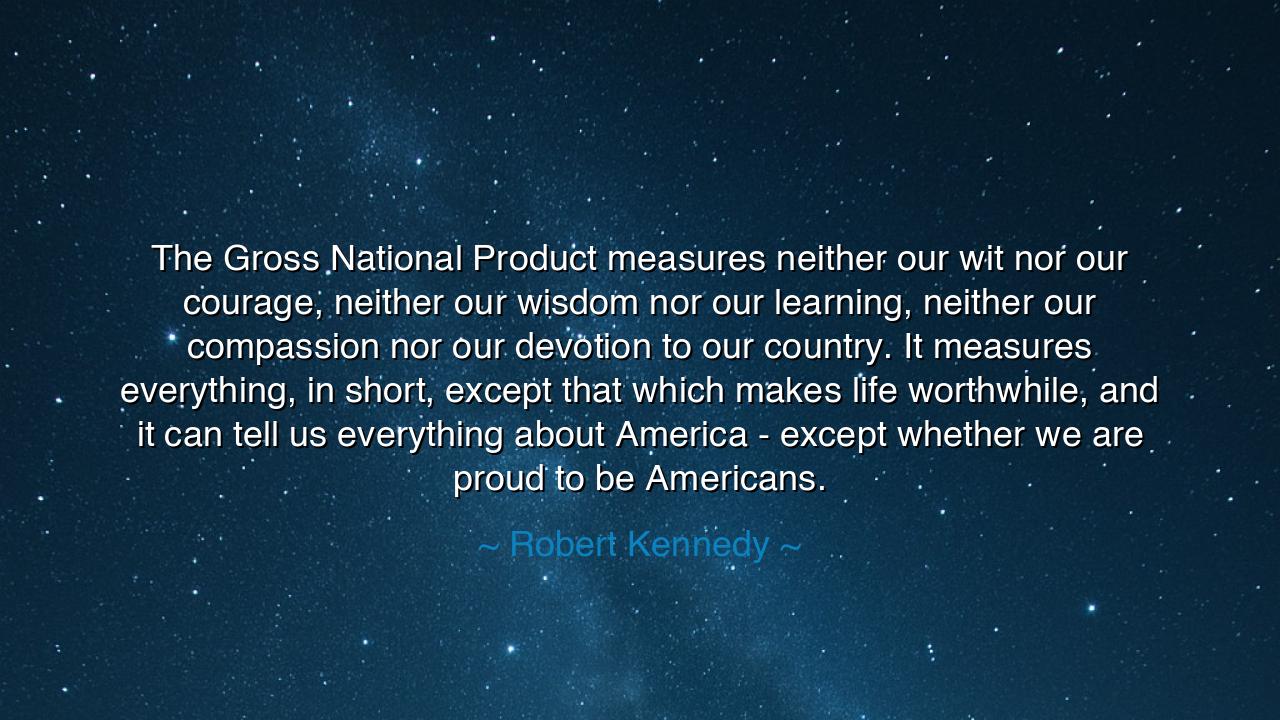
The Gross National Product measures neither our wit nor our
The Gross National Product measures neither our wit nor our courage, neither our wisdom nor our learning, neither our compassion nor our devotion to our country. It measures everything, in short, except that which makes life worthwhile, and it can tell us everything about America - except whether we are proud to be Americans.






“The Gross National Product measures neither our wit nor our courage, neither our wisdom nor our learning, neither our compassion nor our devotion to our country. It measures everything, in short, except that which makes life worthwhile, and it can tell us everything about America — except whether we are proud to be Americans.” Thus spoke Robert F. Kennedy, in the twilight years of the 1960s, when his nation trembled between greatness and despair. In this mighty declaration, he lifted his voice not merely as a statesman, but as a prophet — reminding his people that the worth of a nation is not found in its gold or its commerce, but in the virtues of its soul. His words, both tender and fierce, still echo across the ages as a challenge to all who measure prosperity by numbers and not by nobility.
The meaning of this saying strikes at the heart of modern civilization. Kennedy confronts the illusion that material wealth alone defines success. The Gross National Product, that vast arithmetic of production and consumption, may count the steel of our buildings, the cars we drive, and the goods we sell, but it does not weigh the love between neighbors, the honor of our teachers, the laughter of our children, or the sacrifices of those who serve. It measures what we buy — not what we become. Thus, Kennedy warns that a people who worship numbers and neglect virtue risk building a rich nation with a poor heart. For a society can thrive economically and yet be impoverished in spirit, divided in soul, and hollow in meaning.
The origin of these words lies in a speech delivered at the University of Kansas on March 18, 1968 — only months before Kennedy himself would fall to an assassin’s bullet. It was a time of turbulence: the Vietnam War raged, cities burned, and faith in leadership faltered. Yet Kennedy, standing before the youth of his nation, spoke of compassion, of wisdom, and of moral courage. He urged America to redefine greatness — not in the abundance of its possessions, but in the goodness of its people. He sought to remind a wounded country that progress without conscience is but motion without meaning. His was the call of a man who saw that the machinery of progress must serve the soul of humanity, or it becomes its master.
History itself bears witness to the truth of his warning. Ancient Rome, mighty in wealth and armies, fell not from poverty, but from corruption and moral decay. Its treasuries overflowed, yet its spirit grew barren. The people, once noble and disciplined, were lulled by luxury into apathy. Their Gross National Product — if they had measured it — would have gleamed with triumph, even as their empire began to crumble. So too in our own age, when nations boast of their rising economies while the poor go unheard and the lonely go unseen, Kennedy’s words return like thunder: “It measures everything except that which makes life worthwhile.” For without compassion, no wealth can save us; without virtue, no progress can sustain us.
In Kennedy’s vision, courage and character are the true currencies of a nation. A strong economy may build cities, but only wisdom can build civilization. A surplus of goods cannot replace a shortage of kindness. And while the Gross National Product can calculate our consumption, it cannot account for the generosity of the human heart. Kennedy believed that every citizen, rich or poor, bears a duty to cultivate these unseen treasures — to measure their life not by profit, but by purpose. For what is a nation, if not a community of souls striving toward goodness?
To live by this teaching, one must look beyond the glitter of material success and measure life by its moral weight. Ask not, “How much have I earned?” but, “Whom have I helped?” Do not seek greatness in possessions, but in service, in honor, and in love. Support the arts, cherish learning, nurture the weak, and guard the truth — for these are the roots of a flourishing society. When the time comes to measure your life, the numbers will fade, but the goodness you have planted will endure, bearing fruit in hearts unseen.
The lesson, then, is both personal and eternal: the true measure of prosperity is not what we hold in our hands, but what we carry in our hearts. A nation that forgets this will lose its way; a people that remember it will never fall. Robert Kennedy called his generation — and calls ours still — to live with courage, to act with compassion, to build with conscience. For in the end, it is not our Gross National Product that will define us, but our greatness of spirit. And when our children look back upon us, may they not only see the wealth we created, but the wisdom, kindness, and devotion by which we truly proved ourselves worthy of pride.






AAdministratorAdministrator
Welcome, honored guests. Please leave a comment, we will respond soon